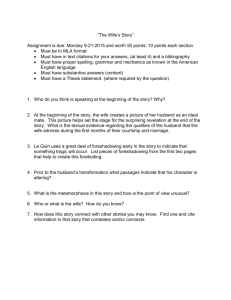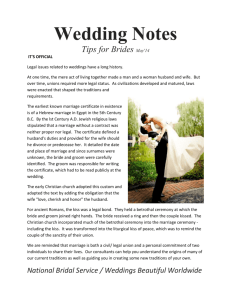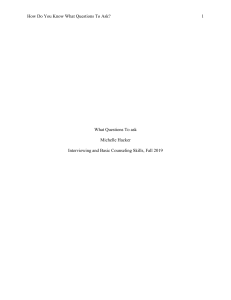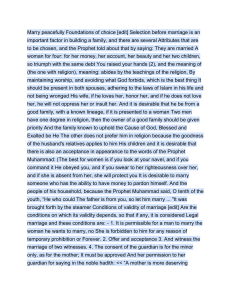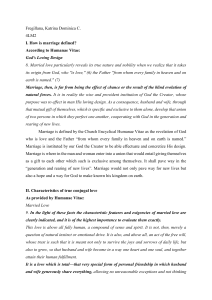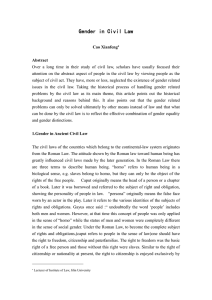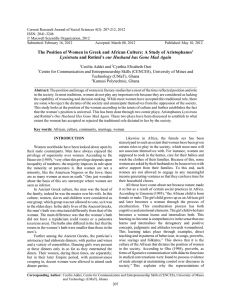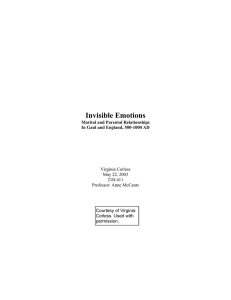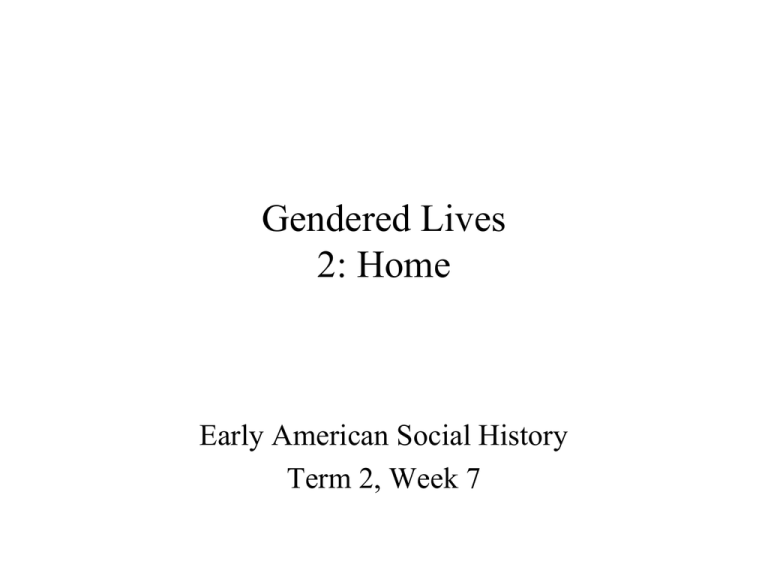
Gendered Lives
2: Home
Early American Social History
Term 2, Week 7
Gender Relations
• How defined?
• Patriarchy
• ideology of spheres.
• Conceptions of masculinity
and femininity
The ‘Ideal’ Family
The Savage Family
Edward Hyde,
Lord
Cornbury
(1661-1723)
Governor of
NY and NJ,
1701-1707
Regional Differences
• opportunities for
women
• Marriage patterns
• life expectancy
Courtship
• Certain amount of free choice, though parents
could be v. influential, esp in New England
• Pre-martial sex common (‘bundling’); betrothal
like marriage
• Women could refuse marriage proposals but not if
pregnant
• Courtship becomes more formal in the 18thC,
more chaperoned, less sexual
Reflections on Courtship and
Marriage (Philadelphia 1746)
• That unhappy matches are often occasioned by
meer mercenary views in one or both of the
parties; or by the headstrong motives of ill
conducted passion.
• That by a prudent and judicious proceeding in our
addresses to a young lady of good natural temper,
a probable foundation may be laid for making her
an agreeable companion, a steady friend and a
good wife
Marriage
‘Benjamin and Eleanor Lanning’ Charles Wilson Peale, 1788
Benjamin Wadsworth, A WellOrdered Family (Boston, 1712).
• Husband and wife should be patient one toward another. If both
are truly pious, yet neither of them is perfectly holy, in such
cases a patient, forgiving, forbearing spirit is very needful. . . .
When, therefore, they quarrel or disagree, then they do the
Devil's work; he is pleased at it, glad of it. But such contention
provokes God; it dishonors Him; it is a vile example before
inferiors in the family; it tends to prevent family prayer.
• The husband's government ought to be gentle and easy, and the
wife's obedience ready and cheerful. The husband is called the
head of the woman. It belongs to the head to rule and govern.
Wives are part of the house and family, and ought to be under
the husband's government. Yet his government should not be
with rigor, haughtiness, harshness, severity, but with the
greatest love, gentleness, kindness, tenderness that may be.
Though he governs her, he must not treat her as a servant, but
as his own flesh; he must love her as himself.
Look e’re you leap, or a History
of Lewd Women (Boston 1762)
• “for no sooner can they lisp but they can lie, and are taught
by their mothers to disguise the truth”
• “they are not what they appear to be. For if a man aims at
riches, she shall pretend to a great fortune, tho’ she is worse
than nothing; and run in debt to make a good
appearance…if she can persuade the deluded lover to make
her his wife, he shall be arrested for all these thing before he
has been married a week…and if a man be to be taken by
beauty, she will both wash and paint, and patch and dress
and do everything that may make her appear fair…if he
chance to marry her, he’ll find…when the morning-light
comes to discover her he has got a very Devil in his arms.”
Women’s domestic role
Elizabeth
and Mary
Freake
Mr
Freake
‘Rachel
Weeping’,
1772
Charles
Wilson Peale
(1741-1827)
Importance of Class
Childbirth
Children
Education
• Forms of education
– Home
– Formal schooling
– Literacy and
numeracy
– Higher education
Earliest College Foundation in each colony
• Harvard (Mass) 1636
• William and Mary (Virginia)
1693
• Yale (Conn) 1701
• Princeton (NJ) 1746
• College of Philadelphia (U
Penn) 1751
• Columbia (NY) 1754
• Brown (RI) 1764
• College of Charleston (South
Carolina) 1770
Harvard (1767)
William & Mary (1770)
Conclusions
• Domestic sphere seen as women’s sphere,
but men retained nominal control.
• Women’s lives quite constrained by 18thC
gender attitudes
• Family as a means for female selfexpression

